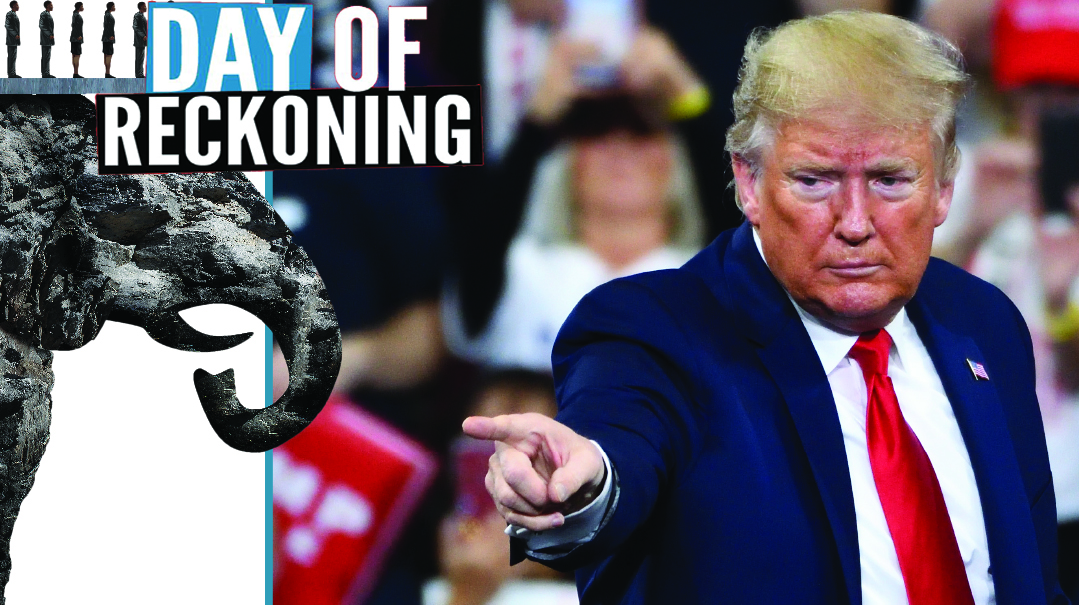The GOP’s Day After

Where does the GOP go from here? With the Trump era at a sudden and shattering end, how can the party find new leadership and continued relevance? What’s waiting in Washington for America’s Orthodox Jewish community, where many are approaching the next four years with trepidation?

Has the spell Donald Trump cast over the Republican Party been broken following last week’s ugly Capitol Hill riots, or can he or his supporters retain their grip?
Could a yawning chasm between pro and anti-Trump forces destroy the Grand Old Party or will it maintain its political equilibrium?
Closer to home, how will the Washington scene play out for America’s Orthodox Jewish community, where many are approaching the next four years with trepidation, while others are breathing a sigh of relief?
In any presidential transition, there are more questions than answers. But this time, the uncertainty abounds
Making political predictions is risky business for a journalist, and one I normally shy away from, but this one doesn’t require going out on a limb.
Republicans will not select Donald Trump to be their standard-bearer in 2024. No shock, considering last week’s lethal riot on Capitol Hill, for which even some Trump supporters placed the blame at the doorstep of the White House.
The endgame might have looked different had Trump bowed out gracefully once it became apparent that he could not produce hard evidence that could stand up in court to prove his claims of voter fraud.
Perhaps if Trump can rehabilitate himself and hold onto his base, he might be able to launch a third-party candidacy in 2024. However, viewed from a cold political perspective, the riots provided antsy Republicans who resigned from his administration en masse with the pretext they needed to create a separation between themselves and Trump.
At this stage, there are too many other potential Republican candidates jockeying for position in 2024 for Trump to elbow them out of the way.
We saw a long list of them basking in the spotlight at last week’s Republican National Committee (RNC) meeting in Amelia Island, Florida, headlined by Nikki Haley, South Dakota Governor Kristi Noem, Florida Governor Ron DeSantis, and Tom Cotton, not to mention Trump’s 2016 rivals Ted Cruz and Rand Paul, and Mitt Romney, who might very well make another stab at it.
In 2016, many of Trump’s rivals underestimated the man they called “the Donald.” They thought his campaign was a publicity stunt. They won’t take Trump for granted again — but at the same time, they also won’t be intimidated from running hard and taking Trump head-on now that he has chinks in his armor.
Any speculation of a Trump comeback must be tempered by the prospect that Trump might lose interest in the job in another four years, when he will be 78. While age didn’t seem to bother Joe Biden, who’s also 78, Trump might eventually come to terms with his loss and rededicate himself to his real estate empire and to improving his handicap on the golf course.
No matter what Trump decides, he has left little doubt that he still has plenty of fight left in him. Trump leveraged his allegations of election fraud to raise funds for a considerable campaign war chest that he has threatened to deploy in the 2022 midterms against Republicans disloyal to him. Perhaps because of that, most of his supporters are sticking with him at least publicly, even if they’re secretly hoping he fades away. Trump loyalists Ronna McDaniel and Tommy Hicks scored easy reelection victories last week as chairwoman and co-chairman of the RNC, which implies that Trump maintains at least one hand on the party’s levers of power.
Yet while the staid Republican Party rarely airs its dirty laundry in public, some key Republicans acknowledge the split between pro-Trump and anti-Trumpers is real and growing. Too many red states turned blue between 2016 and 2020, with Georgia the most noticeable flip. This prompted Bill Palatucci, an aide to former New Jersey Governor Chris Christie, to admit to Politico that the party needs a strategy for surviving a post-Trump world: “We don’t have a future as a party,” he said, “if we can’t win Arizona, Georgia, Pennsylvania, and Michigan.”
Post-Election Tumult
Is the Republican Party headed for a major rift, or is the intra-party turmoil we are witnessing a passing phase? I posed that question last week to Tevi Troy, a former senior White House aide to President George W. Bush, and author of Fight House: Rivalries in the White House from Truman to Trump, cited by the Wall Street Journal as one of the best political books of 2020.
“Can I say both?” Troy began. “There’s always tumult in a political party after an election loss while they rethink and take stock of where they are, where they’re going and what they need to do to change things.”
Politics is a cyclical business. Troy noted that pundits had thrown in the towel on the Democratic Party after three straight losses in the 1980, 1984, and 1988 presidential races. That’s when Democratic leaders formed a think-tank called the Progressive Policy Institute that became the main idea generator for President Bill Clinton’s successful 1992 run for the White House.
Republicans have been undertaking a similar accounting, long before Trump’s November 3 defeat. “Some of the never-Trumpers, like the Lincoln Project people, have said ‘The party’s not for me anymore. I’m out.’ Others want to stay and reform things from the inside and if they do it correctly, they can bring new people into the party,” Troy said.
It’s not only insiders who reevaluate their allegiances; voters among the general public can also shift sides as their perceptions shift. “When I worked for President Bush, the Republicans were considered the party of the elite class,” Troy said. “Today’s Republican Party has become the party of the white working class and it’s the Democrats who are the elite. That’s a big shift.”
Trump can claim a large share of the credit for that shift, but also deserves a major share of the blame for not fully capitalizing on it.
“Trump did a lot of good but it was a mixed bag because as a person, he self-sabotaged a lot of the good work he did with his pride and his ego,” says Nick Muzin, founder and chairman of Stonington Global, a law and lobbying firm based in Washington, D.C.
Muzin is a keen observer of the Republican Party, thanks to his long track record in Washington D.C. during less tumultuous times. Muzin served as chief of staff to South Carolina Senator Tim Scott (when Scott was still in the House of Representatives) and was also a deputy chief of staff and strategic campaign advisor to Ted Cruz during his 2016 presidential campaign. Between those two jobs, he worked as director of coalitions for the House Republican Conference. Muzin said he respects Trump’s accomplishments on the job, mainly the pre-COVID-19 economic revival he engineered, criminal justice reform and his phenomenal work in the Middle East, bringing peace between Israel and several of her Arab neighbors.
“History will judge him better than contemporary commentators are giving him credit for now, but I personally feel the party has to move beyond him and we’re already seeing a new generation of leaders emerging,” Muzin says. “After he leaves office, those voices will be amplified even more and I expect they will return the party to its principals of core conservatism.”
Trump’s Rainbow Coalition
Try as the Republicans might to return to core conservatism — which is shorthand for limited government, low taxes, and an emphasis on personal responsibility — some analysts maintain that the Republican identity crisis will soon be resolved, with the Trump faction retaining the upper hand.
Sean Trende, the senior elections analyst for Real Clear Politics, told me that he used to see a clear distinction between two groups. He called the first party “purists” and counted among their ranks senators such as Ben Sasse and Mike Lee, who are dedicated to shrinking the size of government at all costs. He termed the second group “the populists.” Many of these populists are evangelicals with a strong belief in the Judeo-Christian ethic that they understand to be embedded in the Constitution, and a significant number became Tea Party activists. In 2016, Trump tapped into their energy and molded it into the core of his Make America Great Again movement.
“Trump’s victory really pushed a lot of them to the forefront,” Trende says. “I’m not even sure the difference between the factions makes that much sense anymore; but it seems like the populists have the upper hand right now.”
While Trump’s critics often say the way he catered to the white evangelical vote also lured more odious elements into the party, including white supremacists, Trump’s brand of politics proved attractive to minority voters in growing numbers. As America morphs into a majority-minority nation, Republicans will not be able to win future presidential elections unless they win enough of these votes. That’s one reason Republicans may well stick to the Trump brand.
According to Trump pollster John McLaughlin, the 2020 exit polls show the president won an estimated 32% of the Hispanic vote — the largest share for a GOP presidential nominee since 2004. Trump also won 12% of the black vote, up from 8% four years ago. Most of these new voters are middle-to upper-middle income African Americans and Hispanics. Many of them are small business owners or hold middle-to-upper management jobs and were scared off by this past summer’s riots and looting in major cities and calls to defund the police. That’s a life they thought they left behind when a rising economic tide lifted their ships, enabling their upward mobility. When it came under threat, Trump became their choice to restore stability.
Trump might have lost his re-election bid and blown the senate for the Republicans by harping on voter fraud in Georgia, scaring potential Republican voters from the polls, but he still has long coattails in the House of Representatives. Defying reports of a blue wave, Republicans cut the Democrats’ lead in the House from almost 40 to 11. It might fall to nine if a New York court certifies Claudia Tenney’s narrow win over Anthony Brindisi and if Louisiana voters choose another Republican in a special election to replace Luke Letlow, who died last week of complications due to COVID-19.
“Trump ran a very successful campaign, even though he lost,” says Dr. Amnon Cavari, an American-educated expert at the Lauder School of Government in Herzliya and author of The Party Politics of Presidential Rhetoric during a Zoom conference call, where he explained America’s arcane electoral politics to the perplexed among the foreign press. “I still see a very strong Trump-hold in the Republican Party. We are still only hearing a few voices against him. Will that increase when Trump moves out? I believe it will, but we don’t know yet. We will know better how that pans out in the 2022 and 2024 elections.”
While much emphasis on the 2022 midterms is rightly focused on the senate, where the Democrats are likely to grow their majority (they’re defending only 12 seats compared to 22 from Republicans), the GOP is heavily favored to regain control of the House, thanks to Republican control over the overwhelming majority of legislative districts that will be redrawn based on population shifts recorded in the 2020 Census.
Open-Door Policy
So where do President Trump’s 74 million voters turn if he doesn’t run again?
Joe Concha raised that very question in an opinion piece he penned for The Hill on Friday.
Without naming names, he ticked off a long list of Trump’s accomplishments that a Republican successor could run on, including “a roaring economy and rising wages and record low unemployment (all pre-COVID-19), criminal justice reform, bringing US troops back home, taking out terrorists while destroying the ISIS caliphate, the end of the Obamacare individual mandate, stronger borders, improved trade deals and a conservative majority on the Supreme Court.”
“Remove Trump’s behavior,” Concha concludes, “and his record is as impressive as any first-term president since Reagan.”
Unfortunately, you can’t separate Trump the persona from his policies. While some, myself included, have made the case that only someone as belligerent as Trump could have accomplished what he did, his behavior and personal character were offensive to a wide swath of Orthodox Jewry.
One of the toughest questions we’ve been asked is whether Orthodox Jews, by virtue of their full-throated support for Trump, have painted themselves into a corner that we won’t be able to punch our way out of. After all, the Biden administration takes office next week and once he and Kamala Harris are sworn in, Democrats will control the executive branch and both chambers of Congress.
To answer these questions, I turned to the two most seasoned askanim in Washington D.C.: Rabbi Abba Cohen, vice president for government affairs at Agudath Israel of America; and Nathan Diament, executive director for public policy at the Orthodox Union (OU).
“Based on my experience, I’ve never seen a White House where the door is sealed shut to our community,” says Rabbi Cohen, whose career in advocacy dates back 30 years, when George H.W. Bush was president. “I [also] don’t think our community is easily pigeonholed when it comes to one set of ideologies or another. The challenge is the process of starting over again and building relationships. The way you do that is by building trust. By the way, this doesn’t matter whether we’re going from Democratic to Republican or from Republican to Democratic — or even from a first to second term under the same president [where there is normally a lot of turnover.]”
Nathan Diament also contends that even though it’s no secret that a majority of the Orthodox community supported President Trump in the election, he is optimistic that the working relationship with Biden will be productive. For starters, he says, Biden campaigned on the theme that he will be a president of all Americans, including ones who didn’t vote for him. Perhaps more to the point, the OU already has established relationships with Biden and many of the key appointees, and are engaging with them during the transition.
“Last week alone, OU CEO Rabbi Moshe Hauer participated in a virtual meeting with the Health and Human Service and Surgeon General nominees about COVID-19 response, and I represented the community in a meeting with the Department of Homeland Security nominee,” Diament said. “We anticipate these will be growing relationships.”
Diament said his top domestic policy issues for the next two years are assistance in recovering from the COVID-19 pandemic and tightening security in the face of rising anti-Semitism.
“Even with the vaccine being rolled out, there will still be deep disruption to our yeshivos and shuls — economically and otherwise — and we need to make sure they are included in the recovery programs,” Diament said. “Prior to COVID-19, the surge in anti-Semitic attacks was the foremost issue. Its underlying presence has not abated and has even grown with the continued rise of white supremacist groups. On both these issues, we have found president-elect Biden and his team to be very engaged and determined in working with us to address these challenges.”
Dealing with the issues is one challenge. The other is learning to work with the new faces populating the two most crucial cabinet departments for Orthodox Jews — the Department of Education and the Department of Justice.
President-elect Biden has nominated Miguel Cardona to fill the post of education secretary in place of Betsy DeVos, who endeared herself to the Orthodox community during her term in office.
“There may never be another secretary of education like Betsy DeVos, who viewed educational decisions from an equitable perspective for all kids — public school kids, charter school kids and private schools — and who followed that with such consistency and belief,” says Maury Litwack, founder and executive director of the TEACH Coalition, a multi-state network which in the past seven years has helped grow government aid to nonpublic schools by more than $1 billion.
Having said that, Litwack noted that while the federal Department of Education can clear hurdles and set the tone, 92% of education dollars originate in state and local governments. In this regard, he is optimistic that the transition to the Biden administration will prove beneficial to states grappling with massive debt, such as New York, New Jersey and California, which are home to the country’s largest Orthodox communities.
“We must fight for funding for security, medical aid, and technology funding, so from a funding perspective, we expect Democratic support for state bailouts will prove to be a net positive for a lot of the agenda items that require funding for the frum community,” Litwack says.
Cardona, 45, last served as commissioner of education in Connecticut, a state that provides indirect aid to parochial school students for transportation and health services. While he is not well known to the broader American Orthodox Jewish community, Rabbi Cohen sees Cardona as someone he looks forward to working with.
“In a way, his pick was a relief because some of [Biden’s] other choices came from the teacher-union community, who are known to be very adamant in their advocacy for public schools versus private schools,” Rabbi Cohen said.
Lowering the Flames
Perhaps the bigger changeover, at least from Agudah’s perspective, will be the transition from Attorney General William Barr to Merrick Garland.
Agudah’s — and Rabbi Cohen’s — relationship with Barr goes back 30 years, when Barr also served as President George H.W. Bush’s attorney general. Agudah honored Barr at its 1992 annual dinner with its Humanitarian Award for being a champion of religious liberty.
Merrick Garland, 68, is not as well-known. He is Jewish, was born in Chicago, and worked as a federal prosecutor where he played a leading role in the investigation and prosecution of the 1995 Oklahoma City bombers, who caused 168 deaths in what is still considered to be the worst domestic act of terror on American soil.
For Garland, this is his second chance at a top federal position. President Obama nominated Garland to the Supreme Court in 2016 to fill the vacancy left by the death of Antonin Scalia. Senate Majority Leader Mitch McConnell shelved the nomination, saying it was inappropriate for a lame-duck president to make such a crucial nomination so late in his final term. McConnell’s move paved the way for President Trump to nominate Neil Gorsuch — the first of three picks Trump made that will ensure a conservative majority on the Supreme Court for the foreseeable future.
Aside from his Supreme Court picks, one of Trump’s unsung legacies is the policy changes and legislation he supported to enhance protection for religious institutions when it came to zoning, granting shelter from discrimination suits in hiring decisions, and changes to FEMA policy that allowed religious organizations to receive their fair share of disaster aid.
Preserving and building on those gains is a high priority for the Orthodox community, and provided he wins senate confirmation, Garland will have a lot of clout on those issues.
Here too, Rabbi Cohen is optimistic.
“When he was nominated for Supreme Court justice, we looked for things like judicial temperament and scholarship and fairmindedness,” Rabbi Cohen said. “We saw that Garland is well-regarded, is known as a fair-minded person, and is not known to be a person with a personal political agenda. Those are important qualities for an attorney general as well. But we will follow the hearings closely, where we will learn many more details about his views on justice and law enforcement.”
We can’t possibly know what the next two to four years will bring once Joe Biden raises his right hand to take the oath of office next Wednesday. Looking back on the past four years, the only other prediction I would venture to make is that Biden’s administration — aided and abetted by a mainly supportive, liberal media — will be allotted the fullest opportunity to make the most of its first 100 days in office, and that on paper at least, his low-key tone seems well primed to lower the flames of polarization.
Considering the state of the country, that would be one very welcome change.
(Originally featured in Mishpacha, Issue 844)
Oops! We could not locate your form.













